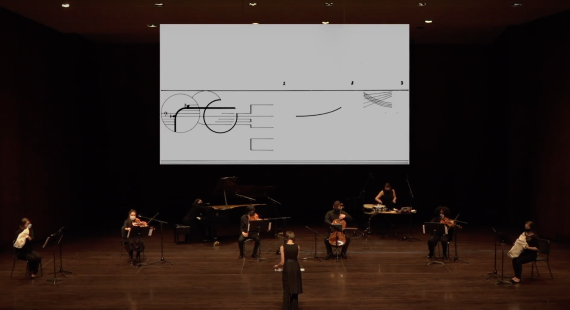Cristina Valdés leads the UW Modern Music Ensemble in a program of works by UW Composition students Joe Krycia, Yonatan Ron, Melissa Wang, Maxwell Williams, Sandesh Nagaraj, and Frederic Rzewski.
Program
Feelin’ Good on a Wednesday (Oh Yeah) (2023): Joe Krycia (b. 1993)
Cassandra Lear and Rachel Reyes, flutes
Nicholas Hidy, trombone
Brian Schappals, bass clarinet
Alex Fang, piano
Rose Martin, melodica, toy piano, fixed-media electronics
similEtude (2023): Yonatan Ron (b. 1992)
Cassandra Lear, flute
Nicholas Hidy, French horn
Ryan Farris, cello
Melissa Wang, percussion
Adjust To You (2023): Melissa Wang (b. 1999)
Rachel Reyes, flute
Brian Schappals, clarinet
Nicholas Hidy, French horn
Rose Martin, percussion
Alex Fang, piano
Cosmic Vultures Refurbished (2023): Maxwell Williams (b. 2002)
Cassandra Lear and Rachel Reyes, flutes
Nicholas Hidy, French horn
Alex Fang, piano
INTERMISSION
Revolting Forms (2023): Sandesh Nagaraj (b. 1988)
Rose Martin and Melissa Wang, percussion
Sandesh Nagaraj, live electronics/interactive video
*Please note that strobe lighting effects will be used during this performance.
Coming Together (1971): Frederic Rzewski (1938–2021)
Daren Weissfisch, narrator
Rachel Reyes, flute
Mackenzie Snow, violin
Nicholas Hidy, French horn
Brian Schappals, bass clarinet
Jai Lasker, electric guitar
Rose Martin and Melissa Wang, percussion
Alex Fang, piano
Program Notes
Feelin’ Good on a Wednesday (2023) by Joe Krycia (b. 1993)
This piece is a formal interpretation of my favorite K-Pop song, TWICE's "Yes or Yes", in the noise/saturation aesthetics of my own musical language.
similEtude (2023) by Yonatan Ron (b. 1992)
At first, a repetitive single-motion gesture made of rhythmic, dynamic, and tone-color uniformity starts to emerge. This homogeny of qualities causes the materials to fuse, making it hard to tell which instrument produces what sounds exactly. The resulting sound of this single motion-gesture depends on the force applied to each instrument. With each repetition, the gesture slowly reveals the sound properties unique to each of the instruments. The complementary section lets these fused materials to slowly “diffract” and diverge from their common points of homogeny and resemblance. The music then gradually transforms back into moments of textural cohesion, this time under a different guise.
Adjust To You (2023) by Melissa Wang (b. 1999)
Adjust to You is a quintet written for the University of Washington Modern Music Ensemble. This composition primarily features pitch combinations of B, C, and D-flat, performed in leaps and dissonant clusters. The style is upbeat and march-like with phasing. Rhythmic patterns of each instrument are assigned to particular time signatures, which are prominent in sections where the time signature frequently changes.
This piece was inspired by a vague and disappointing dream about the cursed and inconvenient nature of my sister’s portable washing and drying machine, which I do not recommend based on personal experience
Cosmic Vultures Refurbished (2023) by Maxwell Williams (b. 2002)
Cosmic Vultures Refurbished is a glimpse into the lives of three bird characters and a nearby spectator. This nearby observer, Claudius Ptolemy (the pianist), grounds this bird sighting in a field of metal trees, mapping out the paths of these birds within constellations that have survived through the ages. Watch as Corvus, Aquila (the two flutes), and Vulturis (the horn) glide, soar, and squabble through the cosmos. How will the avian interplay unfold? Are these somewhat-siblings mere pawns in the grand scheme of things, or is there more here than meets the eye? Find out through partaking in an auditory bird-watching experience unlike no other.
Revolting Forms (2023) by Sandesh Nagaraj (b. 1988)
In the depths of your perception, I exist as shape-shifting truths, inscrutable to your eyes, for I am both you and not you, piercing from within and without, in an eternal hum of paradoxicality.
Coming Together (1971) by Frederic Rzewski (1938–2021)
After being transferred to the Attica state prison, inmate Samuel Melville wrote the following in a letter on May 16, 1971:
“i think the combination of age and the greater coming together is responsible for the speed of the passing time. it's six months now and i can tell you truthfully few periods in my life have passed so quickly. i am in excellent physical and emotional health. there are doubtless subtle surprises ahead but i feel secure and ready.
as lovers will contrast their emotions in times of crisis, so am i dealing with my environment. in the indifferent brutality, incessant noise, the experimental chemistry of food, the ravings of lost hysterical men, i can act with clarity and meaning. i am deliberate--sometimes even calculating--seldom employing histrionics except as a test of the reactions of others. i read much, exercise, talk to guards and inmates, feeling for the inevitable direction of my life.”
In a radical protest of U.S. imperialism and the Vietnam War, Melville was responsible for eight 1969 bombings of governmental and commercial buildings in New York City after his company assigned him to design new offices in South Africa. While at Attica, Melville helped organize the Attica Prison Riot of 1971, which resulted in deaths of 29 inmates and 10 prison employees. This included Melville himself, who survivors said was killed by an officer while attempting to surrender.
In the same year, Frederic Rzewski returned to New York City from Italy, where he had gone to study with Luigi Dallapiccola on a Fullbright scholarship. Regarding Melville’s text, Rzewski wrote:
“As I read it, I was impressed both by the poetic quality of the text and by its cryptic irony. I read it over and over again. It seemed that I was trying both to capture a sense of the physical presence of the writer and, at the same time, to unlock a hidden meaning from the simple but ambiguous language. The act of reading and rereading finally led me to the idea of a musical treatment.”
In Coming Together, which features an open instrumentation, players improvise over a written-out bassline given a set of different rules for each of the eight sections. Throughout, a narrator steadily reads and rereads the Melville text while the pentatonic bass line similarly builds and rebuilds upon itself in each section.
Rzewski, passing away two years ago, is considered one of the most significant composers of the 20th and 21st century. He is renowned for incorporating political, social, and folk elements in his works. His teachers included Randall Thompson, Roger Sessions, Walter Piston, and Milton Babbitt at Philips Academy, Harvard, and Princeton. Rzewski was a Professor of Composition at the Conservatoire Royal de Musique, and also taught briefly at other institutions in the U.S. and Europe.
UW Composition Student Biographies
Joe Krycia
Joe Krycia (b. 1993) is a composer and music educator based in Seattle by way of Michigan and New York City. He is currently pursuing a DMA in composition at the University of Washington, where he also is a teaching assistant in music theory and aural skills. His primary creative and research interests include the use of saturation and noise as a means of obfuscating and transforming musical gestures. His recent work as an educator has included developing aural skills teaching materials using non-classical examples ranging from hardcore punk, K-pop, jazz, and film scores/video game music. Additionally, Joe is interested in ethnomusicology and the de-colonization of Western music education and has been researching/documenting artists from marginalized communities who are drawn to experimental/fringe musical practices as a way of expressing identity.
Sandesh Nagaraj
Sandesh Nagaraj is a composer and performer who was born and raised in India. His works have been featured in Rolling Stone (India), Metal Injection, Score Follower and many blogs around the United States and Europe. Since 2006, he has toured with various groups performing at venues and festivals across India and the United States. Sandesh is currently pursuing his doctoral studies in music composition at University of Washington.
Yonatan Ron
Born in 1992, raised in Israel, composer Yonatan Ron began his musical path at the age of 10, taking guitar and music theory lessons, later continuing under the supervision of composer and guitarist Ruben Seroussi, head of the composition department in The Buchmann-Mehta School of Music at Tel Aviv University. Ron obtained a B.A in Music Composition from the Koninklijk Conservatorium where he studied with composers Cornelis De Bondt and Peter Adriaansz.
Yonatan has been among the first young composers to be accepted to the “Tedarim program” for excellence in composition held by Ensemble Meitar (2015–2016) and his music is recurrently commissioned by The Israeli Music Festival since 2016.
In his work, Yonatan aims to draw the listener’s attention to the notion of continuously transforming gestures, long processual trajectories that gradually unfold, as well as the polarity between Chronos time (quantitative/chronological or sequential, pulse-driven time) and Kairos (uncountable time perception/“frozen” time). Yonatan’s work draws its inspiration from a variety of fields ranging from arts history and music theory to acoustics, human cognition, and memory.
To date, Yonatan is a master’s student at the University of Washington where he studies composition with Huck Hodge and Yiğit Kolat.
Melissa Wang
Melissa Wang is a composer, educator, and percussionist. She received the Bachelor of Music with emphases in Percussion Performance and Instrumental Education at Northern Illinois University, under the direction of Dr. Gregory Beyer and Mr. Ben Wahlund. She received the Associate in Fine Arts in Music at the community college College of DuPage under the direction of Mr. Ben Wahlund, Dr. Tom Tallman, Mr. Lee Kesselman, and Dr. Kenneth Paoli.
Melissa is currently studying at the University of Washington, focusing on Percussion Performance under the direction of Dr. Bonnie Whiting and Composition under the direction of Dr. Huck Hodge and Dr. Yiğit Kolat. Her recent accomplishments include receiving the Research, Engagement and Academic Diversity Grant to obtain funding for her performance web series, “Percussion Works by Women, BIPOC, and LGBTQ+”.
Maxwell Williams
Maxwell Williams is a fifth-year undergraduate student at the University of Washington and is finishing his degrees in both Music Composition and Mathematics. During his studies, he has invested time into discovering the many ways to communicate unique stories through music. Under the guidance of Huck Hodge, Joël-François Durand, and Yiǧit Kolat, he has practiced adapting distinctive personal narratives and abstract concepts into musical works. In the past, the University of Washington Modern Music Ensemble has performed various works by Maxwell, including his piece chicken head for solo flute and electronic tape, as well as his piece titled stepS for vocalists, piano, and performers. As his current work branches into more story-driven musical forms, Maxwell strives to find the balance between enriching character development through sound and complex musical structures.
Director Biographies

Recently hailed by Fanfare Magazine as “excellent” and “clearly sensitive,” Cuban-American pianist Cristina Valdés is known for presenting innovative concerts with repertoire spanning over 300 years. A fierce advocate for new music, she has premiered countless works, including many written for her. She has performed across four continents and in venues such as Lincoln Center, Benaroya Hall, Carnegie Recital Hall, Le Poisson Rouge, Roulette, Miller Theatre, Jordan Hall, and the Kennedy Center. Ms. Valdés has appeared both as a soloist and chamber musician at festivals worldwide including New Music in Miami, the Foro Internacional de Música Nueva in Mexico City, Brisbane Arts Festival, the Festival of Contemporary Music in El Salvador, Havana Contemporary Music Festival, and the Singapore Arts Festival.
An avid chamber musician and collaborator, Ms. Valdés has toured extensively with the Bang On a Can “All Stars”, and has performed with the Seattle Chamber Players, the Mabou Mines Theater Company, the Parsons Dance Company, and Antares. Her performances on both the Seattle Symphony’s Chamber Series and [UNTITLED] concerts have garnered critical acclaim, including her “knockout” (Seattle Times) performance of Bartok’s Sonata for Two Pianos and Percussion, and her “arrestingly eloquent performance” of Dutilleux’s Trois Preludes (Bernard Jacobson/MusicWeb International).
Ms. Valdés has appeared as concerto soloist with the Seattle Symphony, Seattle Philharmonic, the Lake Union Civic Orchestra, Johns Hopkins Symphony Orchestra, the Binghamton Philharmonic, NOCCO, Philharmonia Northwest, the Eastman BroadBand, and the Stony Brook Symphony Orchestra, amongst others. In 2015 she performed the piano solo part of the Ives 4th Symphony with the Seattle Symphony under the direction of Ludovic Morlot, which was later released on CD to critical acclaim and made Gramophone’s list of Top 10 Ives Recordings. Other recent recordings include Orlando Garcia’s From Darkness to Luminosity with the Málaga Philharmonic on the Toccata Classics label, and the world premiere recording of Kotoka Suzuki’s Shimmer, Tree | In Memoriam Jonathan Harvey. She can also be heard on the Albany, Newport Classics, Urtext, and Ideologic Organ labels.
In recent seasons she gave performances of Beethoven’s Piano Concerto No. 3, Bartok’s Piano Concerto No. 3, the world-premiere performance of Carlos Sanchez-Guttierez’s Short Stories for piano and string orchestra with the Orquesta de Cámara de Bellas Artes in Mexico City, and the US Premiere of Under Construction for solo piano and tape playback by Heiner Goebbels at Benaroya Hall. Last season included a wide variety of performances including Gershwin’s Rhapsody in Blue, the premiere of her own composition Sketches of an Anniversary Prelude for trumpet and piano, and the premiere of composer Jeremy Jolley’s (contro-)clessidra IV for piano and electronics written especially for her.
Since 2006 she has made her home in Seattle where she has been an integral part of the new music scene. Ms. Valdés founded the SLAM Festival, a new music festival dedicated to the music of Latin-American composers, and is a core member of the Seattle Modern Orchestra - the only large chamber orchestra in the Pacific Northwest solely dedicated to the music of the 20th and 21st centuries. With the Seattle Modern Orchestra, she has premiered works by Anahita Abbasi, Darius Jones, Wang Lu, Kaley Eaton, Jeremy Jolley, and Yigit Kolat, amongst others.
Ms. Valdés received a Bachelor of Music from the New England Conservatory of Music, and a Master of Music and Doctor of Musical Arts from SUNY Stony Brook. While at Stony Brook, she was a recipient of the Thayer Minority Fellowship, a member of the Stony Brook Graduate Piano Trio, and a winner of the Concerto Competition. She is currently an artist-in-residence at the University of Washington, where she teaches piano and is the director of the UW Modern Music Ensemble.

Huck Hodge is professor and chair of the composition program in the school of music. A composer of “harmonically fresh work", "full of both sparkle and thunder” (New York Times), his music has been praised for its “immediate impact” (Chicago Tribune), its "clever, attractive, streamlined" qualities (NRC Handelsblad, Amsterdam), and its ability to "conjure up worlds of musical magic” with “power and charisma" (Gramophone Magazine, London). There is a dramatic interplay of color, light, and darkness in his music, which emerges from an uncanny blending of pure and dissonant harmonies, widely spaced orchestrations and vast, diffuse timbres.
Hodge is the recipient of many prestigious awards and distinctions. Among these is the Charles Ives Living, the largest music award conferred by the American Academy of Arts and Letters. His other major awards include the Rome Prize (Luciano Berio Fellowship), the Gaudeamus Prize, a Guggenheim Fellowship, commissions from the Koussevitzky Foundation in the Library of Congress, the Fromm Foundation at Harvard University, the American Composers Forum (JFund), the Barlow Endowment, Music at the Anthology (MATA), the American Academy in Rome, Muziek Centrum Nederland, Musik der Jahrhunderte, and the National Theater and Concert Hall of Taiwan, in addition to multiple grants and awards from ASCAP, the Bogliasco Foundation, Copland House, the Deutscher Akademischer Austauschdienst (DAAD), MacDowell, New Music USA, the Siemens Musikstiftung, and Yaddo.
His music has been performed at Carnegie Hall, Lincoln Center and at numerous major festivals — the New York Philharmonic Biennial, Berliner Festspiele, Gaudeamus Muziekweek, Shanghai New Music Week (上海当代音乐周), ISCM World Music Days, and many others in over twenty countries on six continents. Other performances include those by members of the Berlin Philharmonic and Ensemble Modern, the ASKO / Schönberg Ensemble, the Seattle Symphony, and the Orchestra of the League of Composers. His chamber music has been premiered, performed and recorded by a long list of soloists and ensembles such as the Daedalus, JACK, Mivos, and Pacifica string quartets, the Adapter, Aleph, Argento, Dal Niente, Divertimento, Insomnio, SurPlus, and Talea ensembles, and his colleagues David Gordon, Donna Shin, Cristina Valdés, Cuong Vu, and Bonnie Whiting. His published music is distributed by Alexander Street Press (US) and Babel Scores (France). Recordings of his music appear on the New World and Albany record labels and have been featured in numerous national and international broadcasts.
Before joining the University of Washington, Hodge taught composition at Columbia University, where he earned his M.A. and D.M.A. studying with Fred Lerdahl, George Lewis, and Tristan Murail. Prior to this, he studied composition, theory, and new media at the Staatliche Hochschule für Musik und Darstellende Kunst in Stuttgart, Germany, with Marco Stroppa and Georg Wötzer as well as music, German literature and philosophy at the University of Oregon and the Universität Stuttgart. He has been a visiting professor/invited lecturer on music and aesthetics at a variety of institutions including the University of Chicago, CNMAT/UC Berkeley, UCSD, Columbia University, Eastman School of Music, Manhattan School of Music, NYU, and the Universität der Künste in Berlin, and he served for three years as the director of the Merriman Family Young Composers Workshop at the Seattle Symphony.
